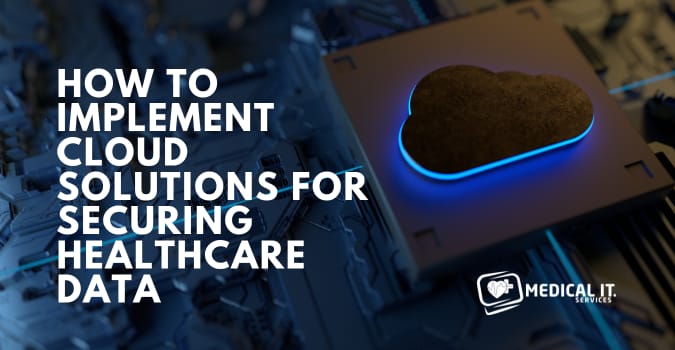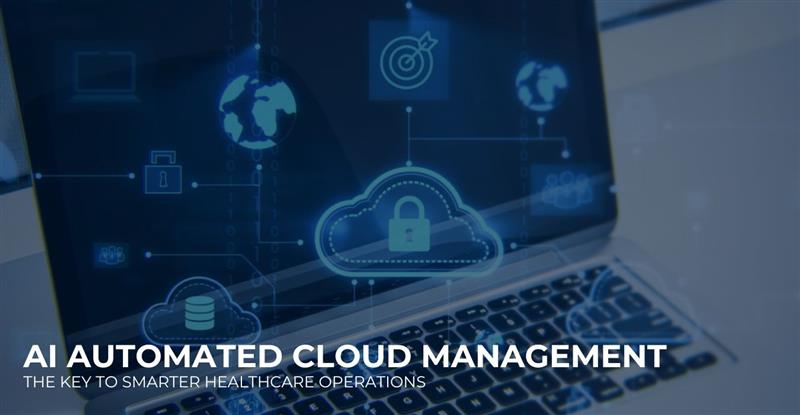In today's fast-paced environment, the Information Technology (IT) sector stands out as one of the…

How to Implement Cloud Solutions for Securing Healthcare Data
In recent years, cloud computing has become an essential technology for healthcare organisations, offering scalable and secure storage solutions that enable healthcare providers to store, manage, and process data efficiently. However, implementing cloud solutions for healthcare data security can be challenging due to the sensitivity of the data and the need to comply with regulations like HIPAA and GDPR. In this article, we will discuss the key strategies and technologies for implementing cloud solutions for securing healthcare data.
Benefits of Cloud Solutions for Healthcare Data
Adopting cloud-based solutions for healthcare data storage and management offers several compelling benefits:
Enhanced Security: Cloud services providers employ robust security measures, including physical security, and network security. And data encryption, to protect healthcare data from unauthorized access, breaches, and cyberattacks.
Scalability: Cloud solutions can seamlessly scale to accommodate fluctuating data storage needs. Enabling healthcare organizations to handle spikes in data volume without infrastructure constraints.
Data Accessibility: Cloud-based data storage facilitates easy access to patient information from authorized personnel. Regardless of their location, it promotes collaboration and efficient care delivery.
Compliance: Cloud solution providers often adhere to stringent compliance regulations. Such as HIPAA, ensuring that healthcare organisations meet data security and privacy standards.
Cost-Effectiveness: Managed Cloud Services can reduce IT infrastructure expenses. As healthcare organizations avoid the upfront costs of hardware and software maintenance.
Compliance: Ensure that your cloud solution complies with industry regulations such as HIPAA, GDPR, and HITECH. This includes implementing data encryption, access controls, and audit trails to protect patient information and demonstrate compliance with regulatory requirements.
Data Security: Implement robust data security measures, including encryption, tokenization, and data loss prevention, to protect patient information from unauthorized access, theft, and data breaches.
Infrastructure Security: Secure your cloud infrastructure with firewalls, intrusion detection systems, and security monitoring to protect against cyber threats and unauthorized access to your data and applications.
Implementing Cloud Solutions: A Step-by-Step Approach
Assessment and Planning: Conduct a thorough assessment of your organisation’s healthcare data needs, identifying data types, storage requirements, and access protocols. Develop a comprehensive cloud adoption plan that outlines migration strategies, security measures, and compliance considerations.
Choose a Reputable Cloud Provider: Evaluate cloud providers based on their security credentials, compliance certifications, industry experience, and track record of protecting healthcare data. Select a provider that aligns with your organisation’s security requirements and offers the necessary service level agreements (SLAs).
Data Migration and Management: Implement secure data migration processes, utilizing encryption and data masking techniques to protect sensitive information during transfer. Establish data governance policies to define clear ownership, access controls, and retention guidelines for healthcare data stored in the cloud.
Implement Robust Security Measures: Employ strong access control protocols, including multi-factor authentication and role-based access controls, to restrict access to healthcare data to authorized personnel only. Leverage cloud-based security tools, such as firewalls, and intrusion detection systems. And data loss prevention (DLP) solutions, to deter and mitigate cyberattacks.
Continuous Monitoring and Auditing: Continuously monitor cloud environments for suspicious activity and potential security breaches. Regularly conduct audits to ensure compliance with regulatory requirements and internal security policies.
Transform Your Healthcare Organisation’s Data Security Posture
By implementing these strategies, healthcare organisations can secure and protect sensitive patient information from unauthorized access, theft, and data breaches. MedicalIT.Services specializes in providing comprehensive managed cloud services specifically tailored to the healthcare industry.
We understand the unique security challenges faced by the healthcare sector. And possess the expertise to implement robust cloud solutions that safeguard sensitive patient data while enhancing operational efficiency. Contact us today to discover how our managed cloud services can transform your healthcare organization’s data security posture and empower you to deliver exceptional care with confidence.




